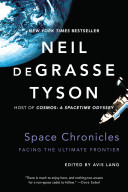Human Space Exploration is Overrated
Perhaps what we should do is genetically engineer new forms of Intelligent life that can survive the stress of space yet still conduct scientific experiments. Actually, such creatures have already been made in the lab. They're called robots. You don't have to feed them, they don't need life support, and they won't get upset if you don't bring them back to Earth. People, on the other hand, generally want to breathe, eat, and eventually come home.
It's probably true that no city has ever held a parade for a robot. But it's probably also true that no city has ever held a parade for an astronaut who wasn't the first (or last) to do something or go somewhere. Can n you name the two Apollo 12 or Apollo 16 astronauts who walked on the Moon? Probably not. Apollo 12 was the second lunar mission. Apollo 16 was^as the second-to-last. But I'll bet you have a favorite picture of the cosmos taken by the orbiting robot known as the Hubble Space Telescope. I'll bet you can recall images from the rovers that have six-wheeled their way across the rocky Martian landscape. I'll further bet that you've seen some jaw-dropping images of the Jovian planets—the gas giants of the outer solar system—and their zoo of moons, images taken over the decades by the Voyager, Galileo, and Cassini space probes.
Notes:
We don't remember most of the astronauts, but we do have favorite space photos taken by all the robots we've sent out into the solar system.
Folksonomies: space exploration space flight
Taxonomies:
/business and industrial/aerospace and defense/space technology (0.613340)
/business and industrial/automation/robotics (0.516641)
/science (0.384682)
Keywords:
Human Space Exploration (0.972998 (neutral:0.000000)), favorite space photos (0.968971 (positive:0.350591)), Jovian planets—the gas (0.890408 (positive:0.261717)), rocky Martian landscape (0.880428 (negative:-0.230547)), Cassini space probes (0.876033 (neutral:0.000000)), outer solar system—and (0.855355 (positive:0.261717)), Hubble Space Telescope (0.854879 (positive:0.580327)), new forms (0.666549 (positive:0.499515)), scientific experiments (0.663203 (neutral:0.000000)), Intelligent life (0.649574 (positive:0.499515)), life support (0.626680 (neutral:0.000000)), lunar mission (0.616242 (neutral:0.000000)), favorite picture (0.602533 (positive:0.580327)), jaw-dropping images (0.595160 (positive:0.261717)), Apollo (0.501222 (neutral:0.000000)), astronauts (0.486517 (neutral:0.000000)), parade (0.456804 (negative:-0.299800)), robots (0.456480 (positive:0.350591)), robot (0.432020 (positive:0.580327)), city (0.418181 (negative:-0.299800)), astronaut (0.373629 (negative:-0.299800)), moons (0.369498 (positive:0.261717)), creatures (0.364876 (negative:-0.316814)), cosmos (0.364492 (positive:0.580327)), Galileo (0.363623 (neutral:0.000000)), lab (0.363201 (negative:-0.316814)), giants (0.361776 (positive:0.261717)), Voyager (0.361663 (neutral:0.000000)), decades (0.361456 (neutral:0.000000)), stress (0.360189 (positive:0.499515))
Entities:
Hubble Space Telescope:Facility (0.963824 (positive:0.580327)), Space Exploration:FieldTerminology (0.911159 (neutral:0.000000)), solar system:FieldTerminology (0.679086 (positive:0.350591)), lunar mission:FieldTerminology (0.662553 (neutral:0.000000)), engineer:JobTitle (0.626982 (positive:0.499515)), rovers:Organization (0.607943 (negative:-0.230547)), Galileo:Person (0.575361 (neutral:0.000000))
Concepts:
Moon (0.961197): dbpedia | freebase
Jupiter (0.786369): dbpedia | freebase | opencyc | yago
Saturn (0.736383): dbpedia | freebase | opencyc | yago
NASA (0.719255): geo | website | dbpedia | freebase | opencyc | yago | crunchbase
Solar System (0.707647): dbpedia | freebase | opencyc
Space exploration (0.672905): dbpedia | freebase | opencyc
Planet (0.672103): dbpedia | freebase | opencyc
Extrasolar planet (0.667311): dbpedia | freebase | yago





